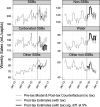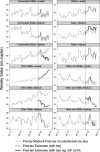Assessing the impact of the Barbados sugar-sweetened beverage tax on beverage sales: an observational study
- PMID: 30700311
- PMCID: PMC6354371
- DOI: 10.1186/s12966-019-0776-7
Assessing the impact of the Barbados sugar-sweetened beverage tax on beverage sales: an observational study
Abstract
Background: The World Health Organization has advocated for sugar-sweetened beverage (SSB) taxes as part of a broader non-communicable disease prevention strategy, and these taxes have been recently introduced in a wide range of settings. However, much is still unknown about how SSB taxes operate in various contexts and as a result of different tax designs. In 2015, the Government of Barbados implemented a 10% ad valorem (value-based) tax on SSBs. It has been hypothesized that this tax structure may inadvertently encourage consumers to switch to cheaper sugary drinks. We aimed to assess whether and to what extent there has been a change in sales of SSBs following implementation of the SSB tax.
Methods: We used electronic point of sale data from a major grocery store chain and applied an interrupted time series (ITS) design to assess grocery store SSB and non-SSB sales from January 2013 to October 2016. We controlled for the underlying time trend, seasonality, inflation, tourism and holidays. We conducted sensitivity analyses using a cross-country control (Trinidad and Tobago) and a within-country control (vinegar). We included a post-hoc stratification by price tertile to assess the extent to which consumers may switch to cheaper sugary drinks.
Results: We found that average weekly sales of SSBs decreased by 4.3% (95%CI 3.6 to 4.9%) compared to expected sales without a tax, primarily driven by a decrease in carbonated SSBs sales of 3.6% (95%CI 2.9 to 4.4%). Sales of non-SSBs increased by 5.2% (95%CI 4.5 to 5.9%), with bottled water sales increasing by an average of 7.5% (95%CI 6.5 to 8.3%). The sensitivity analyses were consistent with the uncontrolled results. After stratifying by price, we found evidence of substitution to cheaper SSBs.
Conclusions: This study suggests that the Barbados SSB tax was associated with decreased sales of SSBs in a major grocery store chain after controlling for underlying trends. This finding was robust to sensitivity analyses. We found evidence to suggest that consumers may have changed their behaviour in response to the tax by purchasing cheaper sugary drinks, in addition to substituting to untaxed products. This has important implications for the design of future SSB taxes.
Keywords: Diabetes prevention; Evaluation; Fiscal policy; Obesity prevention; Sugar-sweetened beverages.
Conflict of interest statement
Ethics approval and consent to participate
Not applicable (no individual human data was collected or used).
Consent for publication
Not applicable.
Competing interests
The authors declare that they have no competing interests.
The findings and conclusions in this report are those of the authors and do not necessarily represent the official position of any funding agencies.
Publisher’s Note
Springer Nature remains neutral with regard to jurisdictional claims in published maps and institutional affiliations.
Figures
Similar articles
-
Changes in prices, sales, consumer spending, and beverage consumption one year after a tax on sugar-sweetened beverages in Berkeley, California, US: A before-and-after study.PLoS Med. 2017 Apr 18;14(4):e1002283. doi: 10.1371/journal.pmed.1002283. eCollection 2017 Apr. PLoS Med. 2017. PMID: 28419108 Free PMC article.
-
Chile's 2014 sugar-sweetened beverage tax and changes in prices and purchases of sugar-sweetened beverages: An observational study in an urban environment.PLoS Med. 2018 Jul 3;15(7):e1002597. doi: 10.1371/journal.pmed.1002597. eCollection 2018 Jul. PLoS Med. 2018. PMID: 29969444 Free PMC article.
-
Trends in beverage prices following the introduction of a tax on sugar-sweetened beverages in Barbados.Prev Med. 2017 Dec;105S:S23-S25. doi: 10.1016/j.ypmed.2017.07.013. Epub 2017 Jul 15. Prev Med. 2017. PMID: 28716655
-
Environmental interventions to reduce the consumption of sugar-sweetened beverages and their effects on health.Cochrane Database Syst Rev. 2019 Jun 12;6(6):CD012292. doi: 10.1002/14651858.CD012292.pub2. Cochrane Database Syst Rev. 2019. PMID: 31194900 Free PMC article.
-
The impact of the tax on sweetened beverages: a systematic review.Am J Clin Nutr. 2018 Sep 1;108(3):548-563. doi: 10.1093/ajcn/nqy135. Am J Clin Nutr. 2018. PMID: 30535085
Cited by
-
Systematic review on fiscal policy interventions in nutrition.Front Nutr. 2022 Nov 29;9:967494. doi: 10.3389/fnut.2022.967494. eCollection 2022. Front Nutr. 2022. PMID: 36532551 Free PMC article.
-
A systematic review of supermarket automated electronic sales data for population dietary surveillance.Nutr Rev. 2022 May 9;80(6):1711-1722. doi: 10.1093/nutrit/nuab089. Nutr Rev. 2022. PMID: 34757399 Free PMC article.
-
A systematic scoping review evaluating sugar-sweetened beverage taxation from a systems perspective.Nat Food. 2023 Nov;4(11):986-995. doi: 10.1038/s43016-023-00856-0. Epub 2023 Oct 19. Nat Food. 2023. PMID: 37857862 Free PMC article.
-
The Effect of Price Changes and Teaspoon Labelling on Intention to Purchase Sugar-Sweetened Beverages: A Discrete Choice Experiment.Appl Health Econ Health Policy. 2022 Mar;20(2):199-212. doi: 10.1007/s40258-021-00688-8. Epub 2021 Nov 5. Appl Health Econ Health Policy. 2022. PMID: 34738192 Clinical Trial.
-
Tackling non-communicable disease risk in young adults across the Caribbean: a call to action.BMJ Glob Health. 2025 Feb 12;10(2):e017010. doi: 10.1136/bmjgh-2024-017010. BMJ Glob Health. 2025. PMID: 39939105 Free PMC article. No abstract available.
References
-
- World Health Organization. Tackling NCDs:‘best buys’ and other recommended interventions for the prevention and control of noncommunicable. diseases. 2017.
-
- Imamura F, O’Connor L, Ye Z, Mursu J, Hayashino Y, Bhupathiraju SN, et al. Consumption of sugar sweetened beverages, artificially sweetened beverages, and fruit juice and incidence of type 2 diabetes: systematic review, meta-analysis, and estimation of population attributable fraction. Br J Sports Med. 2016;50(8):496–504. doi: 10.1136/bjsports-2016-h3576rep. - DOI - PMC - PubMed
Publication types
MeSH terms
Substances
Grants and funding
LinkOut - more resources
Full Text Sources




